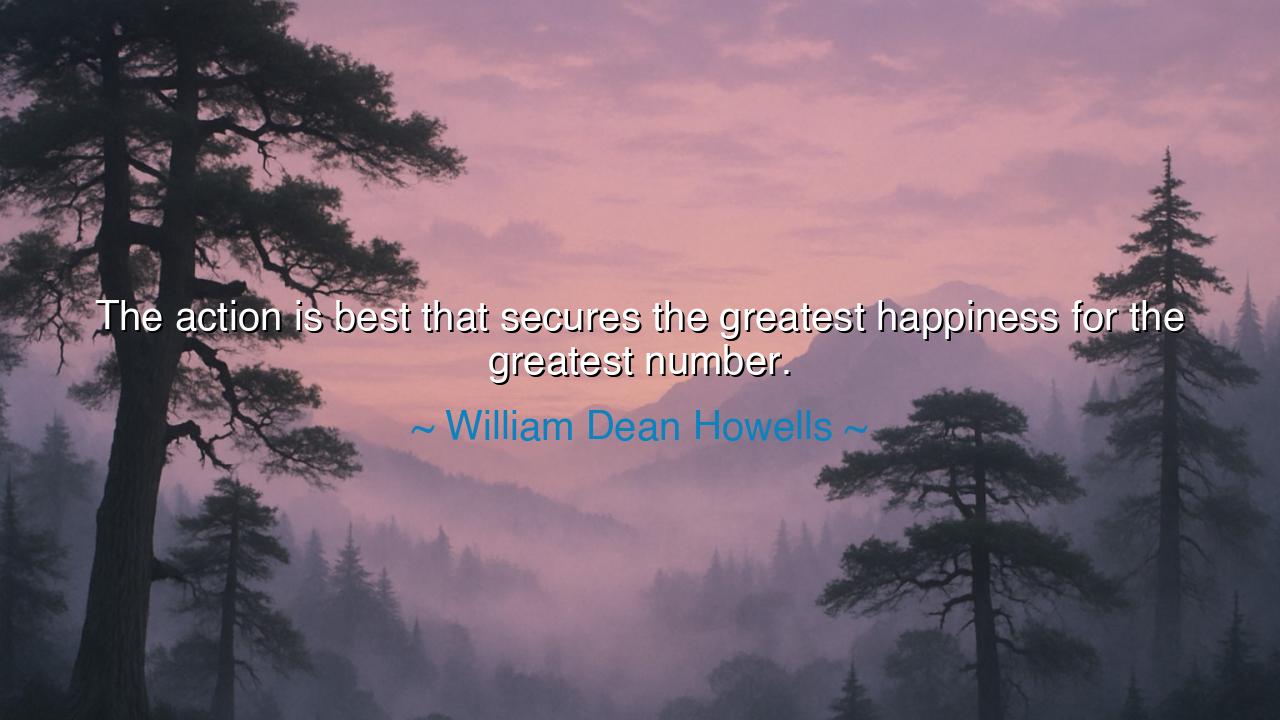
The action is best that secures the greatest happiness for the






The American author and moral thinker William Dean Howells once said: “The action is best that secures the greatest happiness for the greatest number.” In this single line lies a truth as radiant as it is demanding — that the highest form of goodness is not found in self-interest, but in the pursuit of universal well-being. Howells, a man of deep conscience and compassion, spoke not merely as a writer, but as a moral philosopher, echoing a principle that had long resounded through the ages: that our actions are noble only when they bring happiness, justice, and peace not to ourselves alone, but to all whose lives we touch.
To understand the weight of these words, one must see them as part of a long tradition of moral thought. The idea that “the greatest happiness of the greatest number” defines the good can be traced to Jeremy Bentham and John Stuart Mill, the founders of utilitarian philosophy. But Howells, who lived in the turbulence of post–Civil War America, gave this principle a deeply human dimension. He saw in it not an abstract rule, but a living guide for society — a measure by which to judge all actions, whether personal or political. In his eyes, a deed was only truly good when it uplifted the many, not just the few; when it brought light to others, not only comfort to oneself.
Howells was a man of empathy, one who believed that literature itself should serve humanity — that the written word, like moral action, should awaken compassion and promote the common good. In an age marked by industrial growth and social inequality, he called upon his readers to measure progress not by wealth or power, but by the happiness of the people. His quote is both a moral compass and a quiet rebellion — a reminder that true greatness lies not in domination, but in service; not in glory, but in generosity. For the measure of a civilization is not what it builds, but how many hearts it heals.
This truth has been proven again and again throughout history. Consider Mahatma Gandhi, who devoted his life not to his own comfort, but to the liberation and welfare of millions. Gandhi’s life was guided by the same principle Howells expressed — that every act must serve the greater happiness of humanity. His fasting, his marches, his patient endurance of suffering were all acts of love for the collective good. Though he himself lived simply and often in pain, his actions awakened freedom and dignity in an entire nation. Thus, even one soul who dedicates himself to the happiness of the many becomes a light that changes the destiny of the world.
But Howells’ teaching is not only for saints and heroes; it is for every human being. In the quiet choices of daily life — how we treat our neighbors, how we speak, how we give — we hold the power to create joy or suffering. The merchant who trades fairly, the teacher who inspires, the parent who loves unselfishly — these too are architects of the greater happiness. To live for others is not to lose oneself, but to find the deeper meaning of existence. The one who acts with compassion plants seeds that bloom long after their own life has ended.
There is also in this quote a warning — for when a people forget this principle, society decays. When ambition, greed, or power outweigh the common good, happiness becomes a luxury for the few and misery the inheritance of the many. Howells’ words call us back to balance — to remember that no wealth or success can justify harm to others, and that the truest measure of greatness is collective joy. The wise soul, therefore, acts not from impulse or pride, but from a vision of harmony — seeking always to increase the good that can be shared by all.
So, my child, let this truth take root in your heart: live and act not for yourself alone, but for the happiness of the whole. Ask in all things, “Will this bring light to others? Will it lift more souls than it burdens?” For the good that serves many is the only good that endures. Be as the tree that offers shade to all who pass beneath it, as the river that refreshes all who drink. When you make decisions — in your home, your work, your speech, your heart — let the happiness of others guide you. Then you shall live not as one, but as part of a greater whole — and your life, like Howells’ words, will echo in the hearts of generations yet to come.






AAdministratorAdministrator
Welcome, honored guests. Please leave a comment, we will respond soon